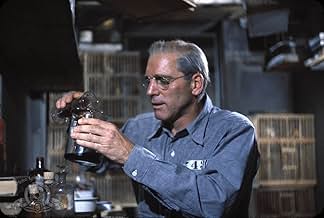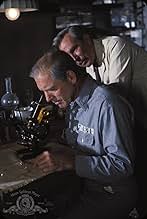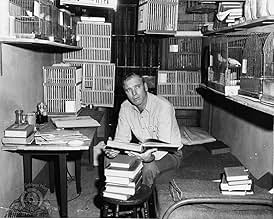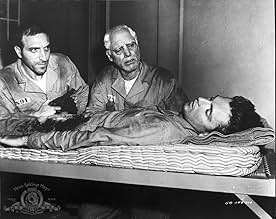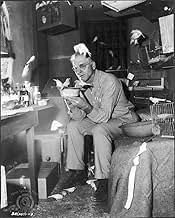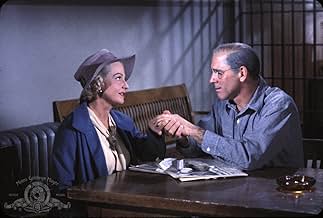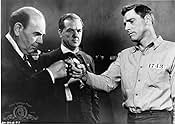IMDb-BEWERTUNG
7,8/10
20.676
IHRE BEWERTUNG
Ein mürrisch verurteilter Mörder, der in permanenter Isolation gehalten wird, rehabilitiert sich, wenn er ein renommierter Vogelexperte wird.Ein mürrisch verurteilter Mörder, der in permanenter Isolation gehalten wird, rehabilitiert sich, wenn er ein renommierter Vogelexperte wird.Ein mürrisch verurteilter Mörder, der in permanenter Isolation gehalten wird, rehabilitiert sich, wenn er ein renommierter Vogelexperte wird.
- Regie
- Drehbuch
- Hauptbesetzung
- Für 4 Oscars nominiert
- 4 Gewinne & 12 Nominierungen insgesamt
Robert Bailey
- Reporter on Dock
- (Nicht genannt)
Nicky Blair
- Inmate
- (Nicht genannt)
John Burnside
- Captain of Marines
- (Nicht genannt)
Robert Burton
- Sen. Ham Lewis
- (Nicht genannt)
Mushy Callahan
- Inmate
- (Nicht genannt)
James J. Casino
- Inmate
- (Nicht genannt)
James Cavanaugh
- Guard
- (Nicht genannt)
Empfohlene Bewertungen
This is a loose telling story of Robert Franklin Stroud (Burt Lancaster) who became known as The Birdman Of Alcatraz.
Have to say I have avoided this film for years purely because of its leading man, but before you Burt Lancaster fans jump on me let me say here and now that I'm now very much a convert these days. A dear on line friend of mine convinced me to check out some of his work last year after they found out I wasn't all that impressed with him, so after watching Atlantic City and his supreme film noirs, I was quickly back in line. This one landed from the rental folk strangely after me enjoying Lancaster in The Unforgiven only last week.
A strange thing with prison films is that few of them actually capture the oppressive feel of incarceration, so when I see one that does, then I'm very over the moon. Director John Frankenheimer manages to put the viewer in with Stroud because the pace is perfect, it's meant to be slow, prison time is slow time, the film is always close and intimate to give you the feel of being there. This film, much like two other greats from the genre in Papillon & Escape From Alcatraz, needs its lead actor to be restrained yet brood with menace, and Lancaster delivers from the top draw here. How unfortunate for him that he should turn in a fantastic turn in the same year that Atticus & Lawrence were dazzling cinema goers. The film never veers into over sentimental slumber because there is much more going on with Stroud, be it his Mother, business acumen, or the political fall out of this murderous man's time in prison.
Watching such macho men like Lancaster & Savalas grow fond of our feathered friends is priceless and brings about scenes that are both touching and poignant at the same time. Whatever the distortion of the facts as regards Robert Stroud's penal life, one thing we do know is that he made an official impact and it makes for one hell of a story. Added bonus here is that you've got Frankenheimer directing deftly in his black & white style, aided considerably by the smart cinematography from Burnett Guffey. And of course from a memorable performance from Big Bad Burt.
I was so impressed I ordered it for my own collection. 9/10
Have to say I have avoided this film for years purely because of its leading man, but before you Burt Lancaster fans jump on me let me say here and now that I'm now very much a convert these days. A dear on line friend of mine convinced me to check out some of his work last year after they found out I wasn't all that impressed with him, so after watching Atlantic City and his supreme film noirs, I was quickly back in line. This one landed from the rental folk strangely after me enjoying Lancaster in The Unforgiven only last week.
A strange thing with prison films is that few of them actually capture the oppressive feel of incarceration, so when I see one that does, then I'm very over the moon. Director John Frankenheimer manages to put the viewer in with Stroud because the pace is perfect, it's meant to be slow, prison time is slow time, the film is always close and intimate to give you the feel of being there. This film, much like two other greats from the genre in Papillon & Escape From Alcatraz, needs its lead actor to be restrained yet brood with menace, and Lancaster delivers from the top draw here. How unfortunate for him that he should turn in a fantastic turn in the same year that Atticus & Lawrence were dazzling cinema goers. The film never veers into over sentimental slumber because there is much more going on with Stroud, be it his Mother, business acumen, or the political fall out of this murderous man's time in prison.
Watching such macho men like Lancaster & Savalas grow fond of our feathered friends is priceless and brings about scenes that are both touching and poignant at the same time. Whatever the distortion of the facts as regards Robert Stroud's penal life, one thing we do know is that he made an official impact and it makes for one hell of a story. Added bonus here is that you've got Frankenheimer directing deftly in his black & white style, aided considerably by the smart cinematography from Burnett Guffey. And of course from a memorable performance from Big Bad Burt.
I was so impressed I ordered it for my own collection. 9/10
There are many combinations in Hollywood that produce fine work; and, then, there are those that produce tremendous work. Directors and actors can often be at odds, but when they are in sync, something wonderful can come of it. Hitchcock made classics with Jimmy Stewart and Cary Grant; Scorcese and Deniro transcend their contemporaries; and Burt Lancaster and John Frankenheimer made great movies together.
I've always liked Burt Lancaster. At first, I had only seen his swashbucklers and his westerns. But, as I discovered his dramas, my respect grew. Lancaster was the perfect leading man. He was tall, good looking, charming, and loaded with charisma. What's more, he had talent. He could turn out a pirate yarn or play a con artist who finds love; a marshall in the most famous gunfight, or a general who abandons his oath; a ghost of a doctor who gets that one at-bat, or a prisoner who becomes an expert on birds. Lancaster is brilliant in this film.
Lancaster was more than a movie star; he was an actor. He never sought the easy route, his life had never been easy. Maybe that's why his movies stand out. Nothing good ever comes easy.
Lancaster presents a brilliant portrayal of Robert Stroud. Whether it is historically accurate or not is beside the point. Lancaster represents the indomitable human spirit; no matter what challenge life throws at him, he rises above. Lancaster is understated in this role, but so powerful. He doesn't need method or make up or any tricks; just his humanity.
So many movies shine due to the presence of Lancaster; but his collaborations with Frankenheimer shine brightest. Frankenheimer is highly underrated, due to his later work; but, there was a period when he was one of the best. The Manchurian Candidate, Seven Days in May, The Train, and Birdman of Alcatraz are clear examples of his talent. Do yourself a favor, when you see a movie in the video store, or on tv, look for the names Frankenheimer and Lancaster. If you find them, watch the movie. You'll be glad you did.
I've always liked Burt Lancaster. At first, I had only seen his swashbucklers and his westerns. But, as I discovered his dramas, my respect grew. Lancaster was the perfect leading man. He was tall, good looking, charming, and loaded with charisma. What's more, he had talent. He could turn out a pirate yarn or play a con artist who finds love; a marshall in the most famous gunfight, or a general who abandons his oath; a ghost of a doctor who gets that one at-bat, or a prisoner who becomes an expert on birds. Lancaster is brilliant in this film.
Lancaster was more than a movie star; he was an actor. He never sought the easy route, his life had never been easy. Maybe that's why his movies stand out. Nothing good ever comes easy.
Lancaster presents a brilliant portrayal of Robert Stroud. Whether it is historically accurate or not is beside the point. Lancaster represents the indomitable human spirit; no matter what challenge life throws at him, he rises above. Lancaster is understated in this role, but so powerful. He doesn't need method or make up or any tricks; just his humanity.
So many movies shine due to the presence of Lancaster; but his collaborations with Frankenheimer shine brightest. Frankenheimer is highly underrated, due to his later work; but, there was a period when he was one of the best. The Manchurian Candidate, Seven Days in May, The Train, and Birdman of Alcatraz are clear examples of his talent. Do yourself a favor, when you see a movie in the video store, or on tv, look for the names Frankenheimer and Lancaster. If you find them, watch the movie. You'll be glad you did.
In 1912, the notorious and violent prisoner Robert Franklin Stroud (Burt Lancaster) is transferred to the Leavenworth Prison convicted for murdering a man. When a guard cancels the visit of his mother Elizabeth Stroud (Thelma Ritter) due to a violation of the internal rules, he stabs and kills the guard and goes to trial three times. He is sentenced to be executed by the gallows, but his mother appeals to President Woodrow Wilson that commutes his sentence to life imprisonment. However, the warden Harvey Shoemaker (Karl Malden) decides to keep Stroud in the solitary for the rest of his life.
One day, Stroud finds a sparrow that has fallen from the nest on the yard and he raises the bird until it is strong enough to fly. Stroud finds a motivation for his life raising and caring birds and becomes an expert in birds. He marries Stella Johnson (Betty Field) and together they run a business, providing medicine developed by Stroud. But a few years after, Stroud is transferred to Alcatraz and has to leave his birds behind.
"Birdman of Alcatraz" is an impressive film based on a true story of a prisoner that finds a purpose of life raising and caring birds and becoming a recognized ornithologist by himself. Burt Lancaster has a top-notch performance in the role of Robert Franklin Stroud and the footages with birds are impressive. However, it seems that Stroud did not have the glamour of the character performed by Burt Lancaster and was actually a psychopath. My vote is nine.
Title (Brazil): "O Homem de Alcatraz" ("The Man of Alcatraz")
One day, Stroud finds a sparrow that has fallen from the nest on the yard and he raises the bird until it is strong enough to fly. Stroud finds a motivation for his life raising and caring birds and becomes an expert in birds. He marries Stella Johnson (Betty Field) and together they run a business, providing medicine developed by Stroud. But a few years after, Stroud is transferred to Alcatraz and has to leave his birds behind.
"Birdman of Alcatraz" is an impressive film based on a true story of a prisoner that finds a purpose of life raising and caring birds and becoming a recognized ornithologist by himself. Burt Lancaster has a top-notch performance in the role of Robert Franklin Stroud and the footages with birds are impressive. However, it seems that Stroud did not have the glamour of the character performed by Burt Lancaster and was actually a psychopath. My vote is nine.
Title (Brazil): "O Homem de Alcatraz" ("The Man of Alcatraz")
"Birdman of Alcatraz" depicts a fictionalized version of the life of Robert Stroud, a real prisoner who served a life sentence in various American prisons, including Alcatraz.
As other viewers have commented, the film fictionalizes the life of the real Robert Stroud, who was a murderer and who has been accused of being a pedophile, as well.
This fictionalization should not interfere with an intelligent viewer's enjoyment of a fine film.
Too, this fictionalization doesn't change the key features of Stroud's case -- a bad man, a man who is shown on screen to be a real murderer, was condemned to death by the state. That much is true from Stroud's real life story, and that much is shown in the film.
Stroud was a difficult person who did not treat other people decently. That much was true of the real Stroud and that is shown in the film.
Stroud's mother pled for his life and President Woodrow Wilson commuted his sentence to life. A warden, aware of how difficult Stroud was to control, declared that Stroud be kept in segregation. That much is true in Stroud's real life story, and that is depicted in the film.
Finally, Stroud became noteworthy for his research and writing on canaries, after he found an injured bird in the recreation yard. That much was true in Stroud's life, and that is shown in the film.
Those who argue that the film is not as accurate as it could be have a point, but the film does follow the facts outlined above.
The film is quiet, and black and white, and yet riveting.
It is an example of a kind of film-making that is sadly lost today. The film attempts a serious discussion of serious issues: the value of a man, the death penalty, the role of prisons, their wardens and guards, the possibility of human connection, even under conditions of relative isolation. Stroud makes some human contact with his guard, and with a fellow inmate he communicates with via tapping.
The film is riveting because its entire cast has a kind of star power that is hard to find today. Even given his quiet, surly performance in this black and white film, you can't take your eyes off of Burt Lancaster. The supporting cast is equally excellent.
This film is a must for anyone interested in cinematic treatments of prisons, of the death penalty, of questions of human worth, even the worth of persons who display their lack of worth in, almost, their every act, and, the kind of films of the late fifties and early sixties that provided intelligent discussions of social issues.
It's also a great movie if you just want to be entertained.
As other viewers have commented, the film fictionalizes the life of the real Robert Stroud, who was a murderer and who has been accused of being a pedophile, as well.
This fictionalization should not interfere with an intelligent viewer's enjoyment of a fine film.
Too, this fictionalization doesn't change the key features of Stroud's case -- a bad man, a man who is shown on screen to be a real murderer, was condemned to death by the state. That much is true from Stroud's real life story, and that much is shown in the film.
Stroud was a difficult person who did not treat other people decently. That much was true of the real Stroud and that is shown in the film.
Stroud's mother pled for his life and President Woodrow Wilson commuted his sentence to life. A warden, aware of how difficult Stroud was to control, declared that Stroud be kept in segregation. That much is true in Stroud's real life story, and that is depicted in the film.
Finally, Stroud became noteworthy for his research and writing on canaries, after he found an injured bird in the recreation yard. That much was true in Stroud's life, and that is shown in the film.
Those who argue that the film is not as accurate as it could be have a point, but the film does follow the facts outlined above.
The film is quiet, and black and white, and yet riveting.
It is an example of a kind of film-making that is sadly lost today. The film attempts a serious discussion of serious issues: the value of a man, the death penalty, the role of prisons, their wardens and guards, the possibility of human connection, even under conditions of relative isolation. Stroud makes some human contact with his guard, and with a fellow inmate he communicates with via tapping.
The film is riveting because its entire cast has a kind of star power that is hard to find today. Even given his quiet, surly performance in this black and white film, you can't take your eyes off of Burt Lancaster. The supporting cast is equally excellent.
This film is a must for anyone interested in cinematic treatments of prisons, of the death penalty, of questions of human worth, even the worth of persons who display their lack of worth in, almost, their every act, and, the kind of films of the late fifties and early sixties that provided intelligent discussions of social issues.
It's also a great movie if you just want to be entertained.
I've always loved this film. It's moving, emotional, stirring, and poetic. It's even capable of generating great empathy with a man who we'd all prefer not to marry our daughters. Stroud, portrayed by Lancaster, is slowly pulled from a life of solitude, misery, hatred and violence by his love of birds. He becomes someone we can identify with, to care about, to wish he was free.
But...and I'm sorry to be the one to tell you this, but Hollywood doesn't always get it right. Yeah, really. The movie is fiction from start to finish. Tom Gaddis' book was wonderful I actually bought a copy at the Alcatraz gift shop years ago and read it eagerly. I believed I had the true story of Stroud. And believed it for years. Until I read 'Birdman: The Many Faces of Robert Stroud' by Jolene Babyak. What a change. When I confirmed the book's accounts from other sources. I was stunned that we'd been so duped by the book and movie.
So there's a lot more to Stroud than Lancaster's gentle giant. He was a vicious psychopath who had killed twice, and wanted to kill more. He wasn't in solitary because of some misprint in his execution order. He was kept in solitary because he was too dangerous to keep with the regular prison population. He was also a savage homosexual rapist who wrote child pornography and had absolutely no regrets about it. When he was up for parole, he openly stated he wanted to get out before he was too old, because 'there were some people who needed killing.' His birdwork, too, was a fabrication. it's been proved now that most of Stroud's writings were plagiarized from other bird books, and even his remedies were nearly as dangerous as they were healing. He got lucky on some, that's all. No reputable bird breeder uses his remedies today. Stroud was alive when the movie was made. He'd smuggled bits and pieces of his 'autobiography,' heavily slanted in his favor, to Tom Gaddis, his own little gullible ghostwriter. And then it hit the big screen. The story generated piles of mail pleading for Stroud's release. He must have smiled at that, if he knew. The U.S. Bureau of Prisons knew what it was doing keeping Stroud in captivity. He was dangerous and would have probably killed even as an old man. He died the day before JFK was shot. I have an old San Jose Mercury News, from November 23, 1963 which on the fhird page has a small article entitled: "Autopsy Performed on Birdman Stroud.' His death in Springfield would have been front-page news but for the JFK Assassination. Actually, a tiny blurb is all he deserved. Have I seen the movie since I read the truth? Sure, but now I watch it for the acting, the cinematography, the drama, not the fiction. It is a great movie, and even Academy Award material. Frankenheimer's direction is superb, with a wonderful score and high accuracy in what life in prison was like in the early half of the last century. Lancaster, Malden, Brand, even a young Telly Savalas did a masterful job. The only thing I'd add is I wonder what the producers who decided to tell this story in such a favorable light, including the writers would have thought if Stroud had been paroled, and then started killing again. I wonder.
For the film, I give it an 8/10. For a work of fiction, a 10/10.
But...and I'm sorry to be the one to tell you this, but Hollywood doesn't always get it right. Yeah, really. The movie is fiction from start to finish. Tom Gaddis' book was wonderful I actually bought a copy at the Alcatraz gift shop years ago and read it eagerly. I believed I had the true story of Stroud. And believed it for years. Until I read 'Birdman: The Many Faces of Robert Stroud' by Jolene Babyak. What a change. When I confirmed the book's accounts from other sources. I was stunned that we'd been so duped by the book and movie.
So there's a lot more to Stroud than Lancaster's gentle giant. He was a vicious psychopath who had killed twice, and wanted to kill more. He wasn't in solitary because of some misprint in his execution order. He was kept in solitary because he was too dangerous to keep with the regular prison population. He was also a savage homosexual rapist who wrote child pornography and had absolutely no regrets about it. When he was up for parole, he openly stated he wanted to get out before he was too old, because 'there were some people who needed killing.' His birdwork, too, was a fabrication. it's been proved now that most of Stroud's writings were plagiarized from other bird books, and even his remedies were nearly as dangerous as they were healing. He got lucky on some, that's all. No reputable bird breeder uses his remedies today. Stroud was alive when the movie was made. He'd smuggled bits and pieces of his 'autobiography,' heavily slanted in his favor, to Tom Gaddis, his own little gullible ghostwriter. And then it hit the big screen. The story generated piles of mail pleading for Stroud's release. He must have smiled at that, if he knew. The U.S. Bureau of Prisons knew what it was doing keeping Stroud in captivity. He was dangerous and would have probably killed even as an old man. He died the day before JFK was shot. I have an old San Jose Mercury News, from November 23, 1963 which on the fhird page has a small article entitled: "Autopsy Performed on Birdman Stroud.' His death in Springfield would have been front-page news but for the JFK Assassination. Actually, a tiny blurb is all he deserved. Have I seen the movie since I read the truth? Sure, but now I watch it for the acting, the cinematography, the drama, not the fiction. It is a great movie, and even Academy Award material. Frankenheimer's direction is superb, with a wonderful score and high accuracy in what life in prison was like in the early half of the last century. Lancaster, Malden, Brand, even a young Telly Savalas did a masterful job. The only thing I'd add is I wonder what the producers who decided to tell this story in such a favorable light, including the writers would have thought if Stroud had been paroled, and then started killing again. I wonder.
For the film, I give it an 8/10. For a work of fiction, a 10/10.
Wusstest du schon
- WissenswertesBurt Lancaster was so immersed in his role that he wept on some occasions, but he asked director John Frankenheimer not to show him cry to the audience.
- PatzerWhile Stroud is at Alcatraz, his cell is depicted with a window. All the cells at Alcatraz were located on inside walls with no openings to the outside.
- Zitate
[last lines]
Robert Stroud: Tom? You know what they used to call Alcatraz in the old days?
Tom Gaddis: What?
Robert Stroud: Bird Island.
Tom Gaddis: [narrating] Robert Stroud's petition for parole has been denied annually for 24 years. Age 72, he is now in his 53rd year of imprisonment.
- Alternative VersionenEuropean release is five minutes longer than original US theatrical version.
- VerbindungenFeatured in Film Review: Burt Lancaster (1968)
Top-Auswahl
Melde dich zum Bewerten an und greife auf die Watchlist für personalisierte Empfehlungen zu.
- How long is Birdman of Alcatraz?Powered by Alexa
Details
- Erscheinungsdatum
- Herkunftsland
- Sprache
- Auch bekannt als
- La celda olvidada
- Drehorte
- Alcatraz Island, San Francisco Bay, Kalifornien, USA(exteriors: long shots)
- Produktionsfirma
- Weitere beteiligte Unternehmen bei IMDbPro anzeigen
Box Office
- Budget
- 2.650.000 $ (geschätzt)
- Laufzeit
- 2 Std. 27 Min.(147 min)
- Farbe
- Seitenverhältnis
- 1.85 : 1
Zu dieser Seite beitragen
Bearbeitung vorschlagen oder fehlenden Inhalt hinzufügen


